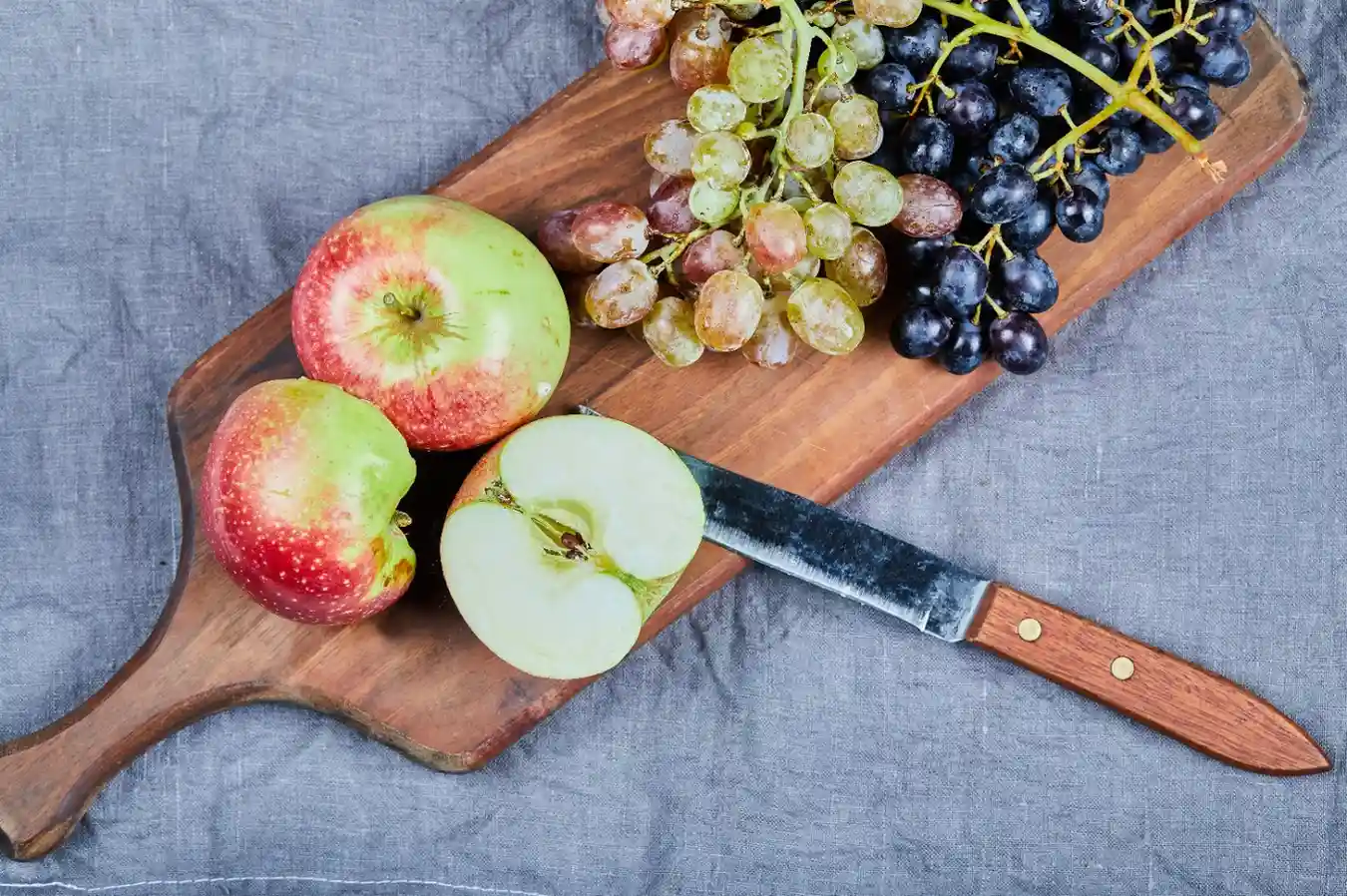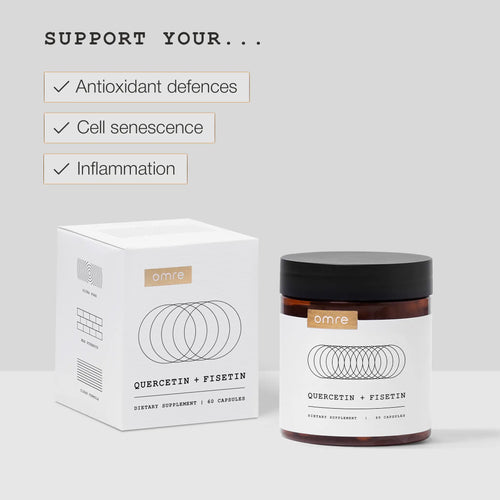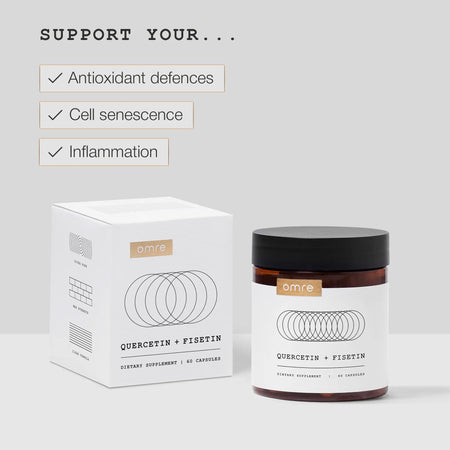Table of Contents
- Key Takeaways
- What is Quercetin?
- Is Quercetin Safe During Pregnancy?
- Why Do Some People Consider Quercetin During Pregnancy?
- What the Research Says About Quercetin in Pregnancy
- Should You Take Quercetin While Pregnant?
- Is Quercetin from Food Safe During Pregnancy?
- Safer Alternatives for Pregnant Women
- Final Words
- FAQs
If you're pregnant and wondering whether quercetin supplements are safe, you're not alone. Quercetin is often praised for its antioxidant and anti-inflammatory benefits, but that doesn't automatically mean it's risk-free during pregnancy.
Here’s what research shows, and what you should know before taking it.
Quercetin + Fisetin
Quercetin and Fisetin help manage 'zombie' senescent cell burden and support cellular rejuvenation.*
Key Takeaways
Quercetin is a plant-based antioxidant found in foods like apples, onions, and berries.
Quercetin supplements are not recommended during pregnancy due to limited safety data and unknown effects at high doses.
Animal studies show that quercetin can cross the placenta, with some long-term changes observed in offspring, such as altered iron storage and inflammation-related gene activity.
No human studies have confirmed safety, and potential drug interactions raise additional concerns.
Food sources of quercetin are safe and provide added nutritional value.
What is Quercetin?
 Quercetin is a plant-based antioxidant found in many fruits and vegetables. It belongs to a group of compounds called flavonoids and is known for its potential to fight inflammation, support the immune system, and protect cells from oxidative stress.
Quercetin is a plant-based antioxidant found in many fruits and vegetables. It belongs to a group of compounds called flavonoids and is known for its potential to fight inflammation, support the immune system, and protect cells from oxidative stress.
In simple terms, quercetin acts like a natural shield. It helps neutralize harmful free radicals in the body and may play a role in heart health, blood sugar balance, and allergy relief.
Because of these benefits, it's commonly sold as a dietary supplement, often in doses much higher than what you'd get from food.
Where Is It Found?
Quercetin is naturally present in a wide range of everyday foods. You’re likely getting some already if you eat a balanced diet with plenty of produce.
Common sources of quercetin include:
Apples (especially with the skin)
Onions (especially red and yellow)
Berries (like blueberries and cranberries)
Capers
Kale and broccoli
Green and black tea
Red wine
Grapes
Is Quercetin Safe During Pregnancy?
-v1750971048656.webp) There’s no solid evidence confirming that quercetin supplements are safe during pregnancy, so most experts recommend avoiding them. While food-based quercetin is fine, high doses from supplements could affect fetal development or interact with other medications.
There’s no solid evidence confirming that quercetin supplements are safe during pregnancy, so most experts recommend avoiding them. While food-based quercetin is fine, high doses from supplements could affect fetal development or interact with other medications.
Rodent studies show that quercetin can cross the placenta and accumulate in fetal tissue. One study found that while it didn’t cause birth defects, it did lead to long-term changes in iron storage and inflammatory gene activity in adult mice (1).
This suggests that quercetin may subtly influence fetal development through epigenetic changes, even if no immediate harm is visible at birth.
Experts advise against supplement use during pregnancy, mostly due to the lack of human studies and the unknowns around high-dose exposure.
If you're pregnant, it's best to focus on getting quercetin from whole foods and talk to your doctor before adding any supplements.
Why Do Some People Consider Quercetin During Pregnancy?
Some pregnant individuals look into quercetin for its potential to manage common discomforts or health concerns. It’s often marketed as a natural way to reduce inflammation, ease allergy symptoms, or support immunity, especially during cold and flu season.
In animal studies, quercetin has shown promise for several pregnancy-related conditions.
For example, a study found that quercetin helped reduce blood pressure and proteinuria in preeclampsia models (2). It also improved outcomes in rodent models of gestational diabetes by lowering oxidative stress and supporting fetal development (3).
Another mouse study found that quercetin exposure in the womb didn’t affect red blood cell development but did lead to increased liver iron storage and changes in inflammatory markers in adult offspring (4).
While this didn’t cause visible harm, it raises questions about how prenatal exposure might shape long-term health.
Because of these potential effects, both helpful and uncertain, some see quercetin as a natural support option. But again, without human safety data, supplementing during pregnancy carries a level of risk that shouldn't be overlooked.
Quercetin + Fisetin
Quercetin and Fisetin help manage 'zombie' senescent cell burden and support cellular rejuvenation.*
What the Research Says About Quercetin in Pregnancy
Animal studies offer useful clues about quercetin’s effects during pregnancy, but there are still many unknowns. Here's a breakdown of what researchers have found so far:
Quercetin Crosses the Placenta
Quercetin doesn’t just stay in the mother’s system; it can reach the fetus. Research in mice shows that quercetin crosses the placenta and accumulates in fetal tissues.
This means any effects, positive or negative, could directly impact the developing baby. While this transfer didn’t cause visible defects, it sets the stage for long-term influence.
No Immediate Harm Found in Rodents
Multiple animal studies found no signs of fetal malformations or developmental toxicity at common supplement doses (e.g., 100–300 mg/kg).
In fact, pregnant rodents exposed to quercetin often had normal pregnancies, and their offspring were born healthy (5). However, the absence of visible harm doesn’t automatically mean it’s safe, especially for long-term health outcomes.
Long-Term Effects on Offspring May Occur
A 2011 study showed that prenatal quercetin exposure led to lasting changes in adult offspring. Mice had increased liver iron storage and higher expression of certain cytokines like hepcidin and IL-6 (6).
Interestingly, they also had lower oxidative stress in the liver, suggesting a mixed effect. These changes were possibly caused by epigenetic shifts, meaning quercetin might subtly reprogram metabolism.
Potential Benefits in Complication Models
In rodent models of pregnancy complications like gestational diabetes and preeclampsia, quercetin showed promise. It helped reduce oxidative stress, inflammation, and even improved fetal survival in some studies.
For example, one study highlighted reduced proteinuria and improved placenta health after quercetin use in preeclampsia models. However, these benefits were all observed in animals, not humans.
Should You Take Quercetin While Pregnant?
Most experts recommend avoiding quercetin supplements during pregnancy due to lack of safety data and potential risks. While food-based quercetin is generally safe, the concentrated doses found in supplements raise several concerns.
There are no human clinical trials confirming whether high-dose quercetin supplements are safe for pregnant women.
Most medical professionals advise against using quercetin supplements during pregnancy or breastfeeding. This caution isn’t due to proven harm, but because there’s not enough safety data to rule out potential risks, especially at high doses.
Another issue is potential drug interactions. Quercetin may interfere with antibiotics, blood thinners, and other medications.
For pregnant women managing existing health conditions, this adds another layer of complexity. Also, the high potency of supplements can quickly exceed levels found in food.
Even if quercetin helps in some contexts, taking it in supplement form during pregnancy could expose both mother and baby to unintended effects.
Is Quercetin from Food Safe During Pregnancy?
Yes, quercetin from natural food sources is safe during pregnancy. You’ll find it in many fruits and vegetables, especially in colorful produce like apples, onions, and berries.
Eating a diet rich in quercetin-containing foods supports antioxidant intake without overwhelming your system. These whole foods also come with fiber, vitamins, and other nutrients that work together to support a healthy pregnancy.
Unlike supplements, the quercetin content in food is balanced by nature. So unless your doctor has advised otherwise, you can safely enjoy these foods as part of a well-rounded diet.
Safer Alternatives for Pregnant Women
-v1750971436927.webp) If you're looking for natural ways to manage inflammation or strengthen your immune system during pregnancy, there are safer, well-researched options.
If you're looking for natural ways to manage inflammation or strengthen your immune system during pregnancy, there are safer, well-researched options.
Some pregnancy-safe alternatives include:
Vitamin C – supports immunity and is antioxidant-rich
Ginger – helps with nausea and has anti-inflammatory effects
Turmeric (in food amounts) – may support inflammation when used in moderation
Omega-3s – promote brain and heart health in both mom and baby
Prenatal vitamins – tailored for pregnancy needs with verified safety
Always speak to your OB-GYN before adding anything new to your supplement routine.
Final Words
Quercetin is a powerful antioxidant, but its safety during pregnancy isn’t fully known. Animal studies show mixed results, some pointing to benefits, others to long-term changes in offspring.
No human trials confirm that quercetin supplements are safe during pregnancy, which is why experts recommend avoiding them for now.
Quercetin-rich foods like apples, onions, and berries are safe to enjoy.
But if you're thinking about taking it as a supplement while pregnant, it's best to consult your doctor first. Until more research is available, sticking with time-tested, pregnancy-safe options is the wiser path.
FAQs
Can I take quercetin supplements during pregnancy?
It's best to avoid quercetin supplements while pregnant. There’s not enough human research to confirm they’re safe, and experts like MedlinePlus and Healthline recommend against their use during pregnancy.
Is quercetin safe in the third trimester?
There’s no trimester-specific safety data for quercetin supplements. Since it can cross the placenta and potentially affect fetal development, it’s safest to avoid supplements throughout all stages of pregnancy.
What foods naturally contain quercetin?
Quercetin is found in many healthy foods, especially colorful fruits and vegetables. Common sources include:
Apples (with skin)
Red and yellow onions
Berries
Kale and broccoli
Capers
Green and black tea
These are safe to eat during pregnancy and offer many additional nutrients.
Are there safer alternatives for inflammation in pregnancy?
Yes, several natural options are considered safe during pregnancy. These include:
Vitamin C from citrus fruits
Ginger for nausea and inflammation
Omega-3s from fish or supplements
Turmeric (in food amounts)
Always talk to your doctor before trying anything new.
Can quercetin harm my baby?
No direct harm has been reported in animal studies, but quercetin can reach fetal tissues and may cause long-term changes in metabolism or gene activity. Because of this uncertainty, it’s safest to avoid high doses from supplements during pregnancy.





